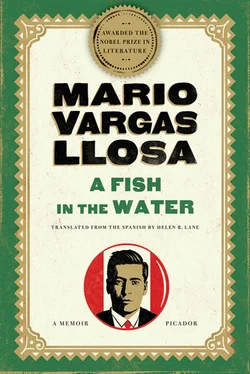Mario Vargas Llosa - A Fish in the Water - A Memoir
Здесь есть возможность читать онлайн «Mario Vargas Llosa - A Fish in the Water - A Memoir» весь текст электронной книги совершенно бесплатно (целиком полную версию без сокращений). В некоторых случаях можно слушать аудио, скачать через торрент в формате fb2 и присутствует краткое содержание. Год выпуска: 2015, Издательство: Macmillan, Жанр: Биографии и Мемуары, на английском языке. Описание произведения, (предисловие) а так же отзывы посетителей доступны на портале библиотеки ЛибКат.
- Название:A Fish in the Water: A Memoir
- Автор:
- Издательство:Macmillan
- Жанр:
- Год:2015
- ISBN:нет данных
- Рейтинг книги:3 / 5. Голосов: 1
-
Избранное:Добавить в избранное
- Отзывы:
-
Ваша оценка:
- 60
- 1
- 2
- 3
- 4
- 5
A Fish in the Water: A Memoir: краткое содержание, описание и аннотация
Предлагаем к чтению аннотацию, описание, краткое содержание или предисловие (зависит от того, что написал сам автор книги «A Fish in the Water: A Memoir»). Если вы не нашли необходимую информацию о книге — напишите в комментариях, мы постараемся отыскать её.
is a twofold book: a memoir of one of Latin America's most celebrated witers, beginning with his birth in 1936 in Arequipa, Peru; and the story of his organization of the reform movement which culminated in his bid for the Peruvian presidency in 1990.
A Fish in the Water: A Memoir — читать онлайн бесплатно полную книгу (весь текст) целиком
Ниже представлен текст книги, разбитый по страницам. Система сохранения места последней прочитанной страницы, позволяет с удобством читать онлайн бесплатно книгу «A Fish in the Water: A Memoir», без необходимости каждый раз заново искать на чём Вы остановились. Поставьте закладку, и сможете в любой момент перейти на страницу, на которой закончили чтение.
Интервал:
Закладка:
Gamboling about with happiness, believing and not believing what I had just heard, I hardly listened to my mother as we headed for the Hotel de Turistas, while she repeated to me that if we ran into my grandparents, or Auntie Mamaé or Uncle Lucho or Aunt Olga, I was not to say a word about what she had just revealed to me. In my excitement, it never entered my mind to ask her the reason for all the mystery, why it had to be kept a secret that my papa was alive and had come to Piura and that within a few minutes I was going to meet him. What would he be like? What would he be like?
We went inside the Hotel de Turistas and, the moment we crossed the threshold of a little reception room that was on the left, a man dressed in a beige suit and wearing a green tie with little white raised dots got up out of his chair and came toward us. “Is this my son?” I heard him say. He leaned down, put his arms around me, and kissed me. I was disconcerted and didn’t know what to do. My face was frozen in a false smile. My consternation was due to the difference between this flesh-and-blood papa, gray at the temples and with such sparse hair, and the handsome young man in a merchant marine uniform whose photo was standing on my night table. I had something of the feeling that it was a con game: this papa didn’t look like the one I had thought was dead.
But I didn’t have time to think about that, for the man was saying that we should come have a ride around Piura in his car. He spoke to my mama with a familiarity that I didn’t much care for and that made me just a little jealous. We went out onto the main square, full of scorching sunlight and people as it was on Sundays, when there were open-air band concerts, and climbed into a blue Ford, with him and my mother in the front seat and me in the back. As we were leaving, a classmate of mine, Espinoza, slender and swarthy-skinned, came by on the sidewalk and was sauntering over to the car in his easygoing way when the car took off and all the two of us could do was wave goodbye to each other.
We drove around the downtown area for a while and all of a sudden the man who was my papa said that we should go see the countryside, the outskirts of town. Why didn’t we go out to Kilometer 50, where there was that little place where we could have a cold drink? I knew that highway marker very well. It was a long-standing custom for us to escort travelers headed for Lima that far, as we had done during the national holidays, when Uncle Jorge, Aunt Gaby, Aunt Laura, and my cousins Nancy and Gladys (and their newborn baby sister, Lucy) had come and spent a few days’ vacation. (Getting together with my cousins once again had been great fun and we had once more played together a lot, although aware, this time, that I was a little boy and they were little girls, and that it was unthinkable, for example, to do things that we had done together back in Bolivia, like sleeping and taking baths together.) The dunes that surround Piura, with their stretches of quicksand, their clumps of carob trees, and their herds of goats, and the mirages of ponds and springs that can be glimpsed there in the afternoons when the red ball of the sun on the horizon tinges the white and gold sands with a light the color of blood, make up a landscape that always impressed me, and that I have never tired of looking at. When I contemplated it, my imagination would run away with me. It was the ideal setting for epic deeds, by cavalrymen and adventurers, by princes who rescued damsels held prisoner or by brave men who fought like lions and routed evildoers. Every time we went along this highway on an outing or to bid someone goodbye, I allowed my imagination to take wing as that burning-hot, deserted landscape went past through the window alongside me. But I am certain that this time I didn’t see anything of what was going on outside the car, on tenterhooks as I was, with all my senses on the alert for what that man and my mama were saying, sotto voce at times, exchanging glances that infuriated me. What were they hinting at to each other underneath what I could hear? They were talking something over and pretending not to be. But I was well aware of that, because I was far from being a dummy. What was it that I was aware of? What were they hiding from me?
And on arriving at Kilometer 50, after having cold drinks, the man who was my papa said that, now that we had gone that far, why not go on to Chiclayo? Was I acquainted with Chiclayo? No, I wasn’t. Well then, let’s go to Chiclayo, so that Marito can get to know the city of rice with duck.
I grew more and more ill at ease and spent the four or five hours’ journey along that unpaved stretch of road, full of ruts and potholes and long lines of trucks on the steep grade up to Olmos, with my mind filled with suspicions, convinced that the whole scheme had been worked out long before, behind my back, with my mama’s complicity. They were trying to trick me as though I were a little kid, when I realized very clearly that I was being deceived. When it got dark, I stretched out on the back seat, pretending to be asleep. But I was wide awake, my head and my soul focused on what they were whispering.
At one moment during the night, I protested: “Grandma and Grandpa are going to be scared when they see that we haven’t come back, Mama.”
“We’ll call them from Chiclayo,” the man who was my papa volunteered.
We arrived at Chiclayo just at first light and there was nothing to eat at the hotel, but I didn’t care, because I wasn’t hungry. They were, though, and bought crackers, which I didn’t touch. They left me in a room by myself and locked themselves in the one next door. I spent what was left of that night with my eyes open and my heart pounding with fear, trying to hear a voice, a sound from the adjoining room, dying with jealousy, feeling that I was the victim of a monstrous act of betrayal. At times I found myself retching in disgust, overcome by an infinite loathing, imagining that my mama might be in there doing those filthy things with that stranger that men and women did together to have children.
In the morning after breakfast, as soon as we got into the blue Ford, he said what I knew very well he was going to say:
“We’re going to Lima, Mario.”
“And what are my grandparents going to say?” I stammered. “Mamaé, Uncle Lucho.”
“What are they going to say?” he answered. “Shouldn’t a son be with his father? Shouldn’t he live with his father? What do you think? How does that strike you?”
He said this in a quiet voice that I heard him use for the first time, with a cutting tone, emphasizing every syllable, which was soon to instill more fear in me than the sermons on hell given us by Brother Agustín when he was preparing us for first communion, there in Cochabamba.
Two. The Plaza San Martín
At the end of July 1987, I found myself in the far north of Peru, on a half-deserted beach, where, years before, a young man from Piura and his wife had built several bungalows with the idea of renting them to tourists. Isolated, rustic, squeezed in between empty stretches of sand, rock cliffs, and the foamy waves of the Pacific, Punta Sal is one of the most beautiful sites in Peru. It has the air of a place outside time and history with its flocks of seabirds — gannets, pelicans, gulls, cormorants, little ducks, and albatrosses, which the locals call tijeretas— parading in orderly formations from the bright dawns to the blood-red twilights. The fishermen of this remote stretch of the Peruvian coast use rafts still made in exactly the same way as in pre-Hispanic times, simple and light: two or three tree trunks tied together and a pole that serves as both an oar and a rudder, with which the fisherman propels the craft along in sweeping gyres, as if tracing circles in the water. The sight of those rafts had greatly impressed me the first time I visited Punta Sal, since no doubt they were craft identical to the raft from Tumbes that, according to the chronicles of the Conquest, was found by Francisco Pizarro and his comrades, four centuries ago and not far from here, and taken to be the first concrete proof that the stories of a golden empire that had made them venture forth from Panama to these shores were a reality.
Читать дальшеИнтервал:
Закладка:
Похожие книги на «A Fish in the Water: A Memoir»
Представляем Вашему вниманию похожие книги на «A Fish in the Water: A Memoir» списком для выбора. Мы отобрали схожую по названию и смыслу литературу в надежде предоставить читателям больше вариантов отыскать новые, интересные, ещё непрочитанные произведения.
Обсуждение, отзывы о книге «A Fish in the Water: A Memoir» и просто собственные мнения читателей. Оставьте ваши комментарии, напишите, что Вы думаете о произведении, его смысле или главных героях. Укажите что конкретно понравилось, а что нет, и почему Вы так считаете.












